
List of Grand Dukes of Russia
Encyclopedia
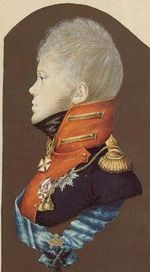
Romanov
The House of Romanov was the second and last imperial dynasty to rule over Russia, reigning from 1613 until the February Revolution abolished the crown in 1917...
who bore the title Velikiy Knjaz (usually translated into English as Grand Duke
Grand Duke
The title grand duke is used in Western Europe and particularly in Germanic countries for provincial sovereigns. Grand duke is of a protocolary rank below a king but higher than a sovereign duke. Grand duke is also the usual and established translation of grand prince in languages which do not...
, but more accurately Grand Prince
Grand Prince
The title grand prince or great prince ranked in honour below emperor and tsar and above a sovereign prince .Grand duke is the usual and established, though not literal, translation of these terms in English and Romance languages, which do not normally use separate words for a "prince" who reigns...
). This courtesy title
Courtesy title
A courtesy title is a form of address in systems of nobility used for children, former wives and other close relatives of a peer. These styles are used 'by courtesy' in the sense that the relatives do not themselves hold substantive titles...
was borne by the sons and male-line grandsons of the Emperors of Russia, along with the style of His Imperial Highness. They were not sovereigns, but members and dynasts of the House of the reigning Emperor.
For those Grand Dukes who were rulers of Russia, see List of Russian rulers.
The title Grand Prince is the English translation of the Russian
Russian language
Russian is a Slavic language used primarily in Russia, Belarus, Uzbekistan, Kazakhstan, Tajikistan and Kyrgyzstan. It is an unofficial but widely spoken language in Ukraine, Moldova, Latvia, Turkmenistan and Estonia and, to a lesser extent, the other countries that were once constituent republics...
Великий князь. The Slavic "knyaz
Knyaz
Kniaz, knyaz or knez is a Slavic title found in most Slavic languages, denoting a royal nobility rank. It is usually translated into English as either Prince or less commonly as Duke....
" and the Baltic "kunigaitis" (both nowadays usually translated as Prince) is actually a cognate of King. Thus, a sovereign "Veliki Knjaz" was more like "high king" than "grand duke".
The title Grand Prince originated from 9th century when rulers of Kievan Rus'
Kievan Rus'
Kievan Rus was a medieval polity in Eastern Europe, from the late 9th to the mid 13th century, when it disintegrated under the pressure of the Mongol invasion of 1237–1240....
were so styled. In later medieval Russian states (the Rus'
Rus' (people)
The Rus' were a group of Varangians . According to the Primary Chronicle of Rus, compiled in about 1113 AD, the Rus had relocated from the Baltic region , first to Northeastern Europe, creating an early polity which finally came under the leadership of Rurik...
) it already was used simultaneously by several rulers in the more expanded Rurikid dynasty and additionally by rulers of neighboring Lithuania
Lithuania
Lithuania , officially the Republic of Lithuania is a country in Northern Europe, the biggest of the three Baltic states. It is situated along the southeastern shore of the Baltic Sea, whereby to the west lie Sweden and Denmark...
(Gediminid dynasty).
The title velikiy knyaz continued as a courtesy title
Courtesy title
A courtesy title is a form of address in systems of nobility used for children, former wives and other close relatives of a peer. These styles are used 'by courtesy' in the sense that the relatives do not themselves hold substantive titles...
for all or several members of the dynasty, such as the Grand Duke of Russia (velikiy knjaz) that belonged to members of the family of the Russian tsar in Russia's imperial era, from the 17th century, although these Grand Princes were not sovereigns. For those Grand Dukes who were rulers of Russia, see List of Russian rulers.
Bearing the title Velikiy Kniaz originally had no specific rules: it traditionally belonged to all dynasts, and additionally, dynasts were created by the act of granting the title to some other heirs. Until the 19th century, the Russian Imperial House was usually in a precarious situation, having often no more than a couple of male dynasts, if even that many. The number to use the title was thus not abundant. Empress Elisabeth of Russia, after all male-line descent had been exhausted, made her sister's son, the future Peter III of Russia
Peter III of Russia
Peter III was Emperor of Russia for six months in 1762. He was very pro-Prussian, which made him an unpopular leader. He was supposedly assassinated as a result of a conspiracy led by his wife, who succeeded him to the throne as Catherine II.-Early life and character:Peter was born in Kiel, in...
a dynast and a Grand Duke, although he was not of male-line descent.
After the births of the numerous sons of Nicholas I of Russia
Nicholas I of Russia
Nicholas I , was the Emperor of Russia from 1825 until 1855, known as one of the most reactionary of the Russian monarchs. On the eve of his death, the Russian Empire reached its historical zenith spanning over 20 million square kilometers...
, the number of Grand Dukes increased into higher orders of magnitude. This afforded Russia a respite from earlier fragility that had plagued Russian succession, having led even as itself the country to instability. The right to the title was not traditionally limited, and in 1880's (when there existed well over twenty male dynasts) Alexander III of Russia
Alexander III of Russia
Alexander Alexandrovich Romanov , historically remembered as Alexander III or Alexander the Peacemaker reigned as Emperor of Russia from until his death on .-Disposition:...
felt that their high number, if all allowed to use Grand Duke, diminishes the prestige of the Imperial House and the weight of the title itself.
Alexander III formalized the use of titles in the Imperial House in 1886 (on 2 July 1886 Julian calendar, 14 July 1886 Gregorian) by such amendment to the succession laws. Grand Duke belonged henceforward only to sons and paternal grandsons of the Emperors of Russia, and Grand Duchess correspondingly only to daughters and paternal granddaughters, as well as to legitimate wives of Grand Dukes.
One male infant already 9 days old at the time of Alexander's edict thus lost the title. Those Russian dynasts who genealogically were distant from Emperors (as not to be Grand Dukes) were entitled to titulary Prince of Russia. Ioann Konstantinovich of Russia (1886–1918) was apparently the only who lost the grand ducal title accorded by convention at birth but removed by Alexander III. Alexander III's own grandchildren, children of his daughter Xenia Alexandrovna
Grand Duchess Xenia Alexandrovna of Russia
Grand Duchess Xenia Alexandrovna of Russia was a daughter of Tsar Alexander III of Russia and the elder of Tsar Nicholas II two sisters. She married her cousin Grand Duke Alexander Mikailovich of Russia, with whom she had seven children....
, were not yet born at the time of the edict, and accordingly became "only" Princes of Russia from their births, as they were great-grandchildren of Nicholas I (one generation too far) when looking at the male lineage.
The numbers began to decrease for other reasons too. In the last three decades before the revolution, only a couple of boys were born who were entitled to grand ducal title. After the revolution, particularly morganatic marriage
Morganatic marriage
In the context of European royalty, a morganatic marriage is a marriage between people of unequal social rank, which prevents the passage of the husband's titles and privileges to the wife and any children born of the marriage...
s axed numbers of dynasts to increasingly low numbers. Alexander III's edict has led to the situation where there is no longer any descendant to be uncontestedly entitled to grand ducal title.
Great Prince or Grand Prince
Grand Prince
The title grand prince or great prince ranked in honour below emperor and tsar and above a sovereign prince .Grand duke is the usual and established, though not literal, translation of these terms in English and Romance languages, which do not normally use separate words for a "prince" who reigns...
would be a more accurate translation of this Russian title, but that term is neither standard nor widely used in English nor in French. In German, however, a Russian Grand Duke was known as a Großfürst, and in Latin
Latin
Latin is an Italic language originally spoken in Latium and Ancient Rome. It, along with most European languages, is a descendant of the ancient Proto-Indo-European language. Although it is considered a dead language, a number of scholars and members of the Christian clergy speak it fluently, and...
as Magnus Princeps. "Grand Duke" is the traditional translation of the title Velikiy Kniaz in languages which do not have different words for prince
Prince
Prince is a general term for a ruler, monarch or member of a monarch's or former monarch's family, and is a hereditary title in the nobility of some European states. The feminine equivalent is a princess...
as a substantive title
Substantive title
A substantive title is a title of nobility or royalty held by someone , which was acquired either by direct grant or inheritance...
and prince as a courtesy title
Courtesy title
A courtesy title is a form of address in systems of nobility used for children, former wives and other close relatives of a peer. These styles are used 'by courtesy' in the sense that the relatives do not themselves hold substantive titles...
. English and French are such languages.
Grand Dukes of Russia of the House of Romanov-Holstein-Gottorp
| Picture | Name | Father | Born | Died | Notes |
|---|---|---|---|---|---|
| Peter Feodorovich Peter III of Russia Peter III was Emperor of Russia for six months in 1762. He was very pro-Prussian, which made him an unpopular leader. He was supposedly assassinated as a result of a conspiracy led by his wife, who succeeded him to the throne as Catherine II.-Early life and character:Peter was born in Kiel, in... |
Karl Friedrich, Duke of Holstein-Gottorp | 21 February 1728 | 17 July 1762 | succeeded as Emperor Peter III in 1762 | |
| Pavel Petrovich Paul I of Russia Paul I was the Emperor of Russia between 1796 and 1801. He also was the 72nd Prince and Grand Master of the Order of Malta .-Childhood:... |
Peter Feodorovich Peter III of Russia Peter III was Emperor of Russia for six months in 1762. He was very pro-Prussian, which made him an unpopular leader. He was supposedly assassinated as a result of a conspiracy led by his wife, who succeeded him to the throne as Catherine II.-Early life and character:Peter was born in Kiel, in... |
1 October 1754 | 23 March 1801 | succeeded as Emperor Paul I in 1796 | |
| Alexander Pavlovich Alexander I of Russia Alexander I of Russia , served as Emperor of Russia from 23 March 1801 to 1 December 1825 and the first Russian King of Poland from 1815 to 1825. He was also the first Russian Grand Duke of Finland and Lithuania.... |
Pavel Petrovich Paul I of Russia Paul I was the Emperor of Russia between 1796 and 1801. He also was the 72nd Prince and Grand Master of the Order of Malta .-Childhood:... |
23 December 1777 | 1 December 1825 | succeeded as Emperor Alexander I in 1801 | |
| Konstantin Pavlovich Grand Duke Constantine Pavlovich of Russia Constantine Pavlovich was a grand duke of Russia and the second son of Emperor Paul I. He was the Tsesarevich of Russia throughout the reign of his elder brother Alexander I, but had secretly renounced his claim to the throne in 1823... |
Pavel Petrovich Paul I of Russia Paul I was the Emperor of Russia between 1796 and 1801. He also was the 72nd Prince and Grand Master of the Order of Malta .-Childhood:... |
8 May 1779 | 27 June 1831 | ||
| Nikolai Pavlovich Nicholas I of Russia Nicholas I , was the Emperor of Russia from 1825 until 1855, known as one of the most reactionary of the Russian monarchs. On the eve of his death, the Russian Empire reached its historical zenith spanning over 20 million square kilometers... |
Pavel Petrovich Paul I of Russia Paul I was the Emperor of Russia between 1796 and 1801. He also was the 72nd Prince and Grand Master of the Order of Malta .-Childhood:... |
6 July 1796 | 2 March 1855 | succeeded as Emperor Nicholas I in 1825 | |
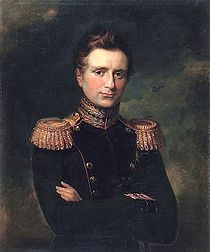 |
Mikhail Pavlovich Grand Duke Michael Pavlovich of Russia Grand Duke Michael Pavlovich of Russia was the tenth child and fourth son of Paul I of Russia and Sophie Dorothea of Württemberg.-Marriage and issue:In St... |
Pavel Petrovich Paul I of Russia Paul I was the Emperor of Russia between 1796 and 1801. He also was the 72nd Prince and Grand Master of the Order of Malta .-Childhood:... |
8 February 1798 | 9 September 1849 | |
| Alexander Nikolaievich Alexander II of Russia Alexander II , also known as Alexander the Liberator was the Emperor of the Russian Empire from 3 March 1855 until his assassination in 1881... |
Nikolai Pavlovich Nicholas I of Russia Nicholas I , was the Emperor of Russia from 1825 until 1855, known as one of the most reactionary of the Russian monarchs. On the eve of his death, the Russian Empire reached its historical zenith spanning over 20 million square kilometers... |
17 April 1818 | 13 March 1881 | succeeded as Emperor Alexander II in 1855 | |
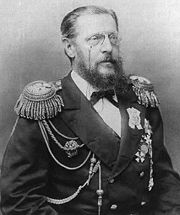 |
Konstantine Nikolaievich Grand Duke Konstantin Nikolayevich of Russia Grand Duke Konstantin Nikolayevich of Russia was the second son of Tsar Nicholas I of Russia.During the reign of his brother Alexander II, Konstantin was an admiral of the Russian fleet and reformed the Russian Navy. He was also an instrumental figure in the emancipation of the serfs... |
Nikolai Pavlovich Nicholas I of Russia Nicholas I , was the Emperor of Russia from 1825 until 1855, known as one of the most reactionary of the Russian monarchs. On the eve of his death, the Russian Empire reached its historical zenith spanning over 20 million square kilometers... |
21 September 1827 | 29 January 1892 | |
| Alexander Mikhailovich | Mikhail Pavlovich Grand Duke Michael Pavlovich of Russia Grand Duke Michael Pavlovich of Russia was the tenth child and fourth son of Paul I of Russia and Sophie Dorothea of Württemberg.-Marriage and issue:In St... |
28 January 1831 | 27 March 1832 | ||
| Nikolai Nikolaievich | Nikolai Pavlovich Nicholas I of Russia Nicholas I , was the Emperor of Russia from 1825 until 1855, known as one of the most reactionary of the Russian monarchs. On the eve of his death, the Russian Empire reached its historical zenith spanning over 20 million square kilometers... |
8 August 1831 | 25 April 1891 | ||
| Mikhail Nikolaievich | Nikolai Pavlovich Nicholas I of Russia Nicholas I , was the Emperor of Russia from 1825 until 1855, known as one of the most reactionary of the Russian monarchs. On the eve of his death, the Russian Empire reached its historical zenith spanning over 20 million square kilometers... |
25 October 1832 | 18 December 1909 | ||
| Nicholas Alexandrovich Grand Duke Nicholas Alexandrovich of Russia For the son of Alexander III, who succeeded his father on the throne in 1894, see Nicholas II of Russia.Nicholas Alexandrovich Romanov , full title: Heir, Tsesarevich and Grand Duke of Russia was Tsesarevich —the heir apparent—of Imperial Russia from 2 March 1855 until... |
Alexander Nikolaievich Alexander II of Russia Alexander II , also known as Alexander the Liberator was the Emperor of the Russian Empire from 3 March 1855 until his assassination in 1881... |
20 September 1843 | 24 April 1865 | ||
| Alexander Alexandrovich Alexander III of Russia Alexander Alexandrovich Romanov , historically remembered as Alexander III or Alexander the Peacemaker reigned as Emperor of Russia from until his death on .-Disposition:... |
Alexander Nikolaievich Alexander II of Russia Alexander II , also known as Alexander the Liberator was the Emperor of the Russian Empire from 3 March 1855 until his assassination in 1881... |
10 March 1845 | 1 November 1894 | succeeded as Emperor Alexander III in 1881 | |
| Vladimir Alexandrovich Grand Duke Vladimir Alexandrovich of Russia Grand Duke Vladimir Alexandrovich of Russia ) was a son of Emperor Alexander II of Russia... |
Alexander Nikolaievich Alexander II of Russia Alexander II , also known as Alexander the Liberator was the Emperor of the Russian Empire from 3 March 1855 until his assassination in 1881... |
22 April 1847 | 17 February 1909 | ||
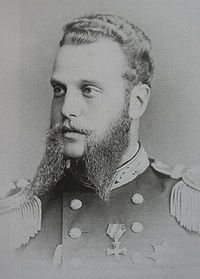 |
Alexei Alexandrovich Grand Duke Alexei Alexandrovich of Russia Grand Duke Alexei Alexandrovich of Russia was the sixth child and the fourth son of Alexander II of Russia and his first wife Maria Alexandrovna . Destined to a naval career, Alexei Alexandrovich started his military training at the age of 7... |
Alexander Nikolaievich Alexander II of Russia Alexander II , also known as Alexander the Liberator was the Emperor of the Russian Empire from 3 March 1855 until his assassination in 1881... |
14 January 1850 | 14 November 1908 | |
 |
Nikolai Konstantinovich Grand Duke Nikolai Konstantinovich of Russia Grand Duke Nicholas Constantinovich of Russia was the first-born son of Grand Duke Konstantin Nikolayevich of Russia and Grand Duchess Alexandra Iosifovna of Russia and a grandson of Nicholas I of Russia.-Early life:... |
Konstantine Nikolaievich Grand Duke Konstantin Nikolayevich of Russia Grand Duke Konstantin Nikolayevich of Russia was the second son of Tsar Nicholas I of Russia.During the reign of his brother Alexander II, Konstantin was an admiral of the Russian fleet and reformed the Russian Navy. He was also an instrumental figure in the emancipation of the serfs... |
14 February 1850 | 14 January 1918 | |
| Nikolai Nikolaievich | Nikolai Nikolaievich | 18 November 1856 | 5 January 1929 | ||
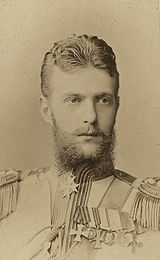 |
Sergei Alexandrovich Grand Duke Sergei Alexandrovich of Russia Grand Duke Sergei Alexandrovich of Russia was a son of Emperor Alexander II of Russia... |
Alexander Nikolaievich Alexander II of Russia Alexander II , also known as Alexander the Liberator was the Emperor of the Russian Empire from 3 March 1855 until his assassination in 1881... |
10 May 1857 | 17 February 1905 | |
| Konstantine Konstantinovich Grand Duke Konstantin Konstantinovich of Russia Grand Duke Constantine Constantinovich of Russia was a grandson of Emperor Nicholas I of Russia, and a poet and playwright of some renown... |
Constantin Nikolaievich Grand Duke Konstantin Nikolayevich of Russia Grand Duke Konstantin Nikolayevich of Russia was the second son of Tsar Nicholas I of Russia.During the reign of his brother Alexander II, Konstantin was an admiral of the Russian fleet and reformed the Russian Navy. He was also an instrumental figure in the emancipation of the serfs... |
22 August 1858 | 15 June 1915 | ||
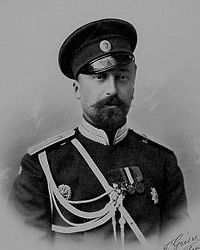 |
Nikolai Mikhailovich Grand Duke Nicholas Mikhailovich of Russia Grand Duke Nicholas Mikhailovich of Russia , 26 April 1859 – 28 January 1919 was the eldest son of Grand Duke Michael Nicolaievich of Russia and a first cousin of Alexander III.... |
Mikhail Nikolaievich | 26 April 1859 | 30 January 1919 | |
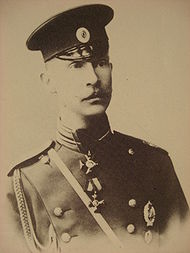 |
Dimitri Konstantinovich | Konstantin Nikolaievich Grand Duke Konstantin Nikolayevich of Russia Grand Duke Konstantin Nikolayevich of Russia was the second son of Tsar Nicholas I of Russia.During the reign of his brother Alexander II, Konstantin was an admiral of the Russian fleet and reformed the Russian Navy. He was also an instrumental figure in the emancipation of the serfs... |
13 June 1860 | 30 January 1919 | |
| Pavel Alexandrovich Grand Duke Paul Alexandrovich of Russia Grand Duke Paul Alexandrovich of Russia was the eighth child of Tsar Alexander II of Russia by his first wife Empress Maria Alexandrovna. His birth was commemorated by the naming of the city of Pavlodar in Kazakhstan... |
Alexander Nikolaievich Alexander II of Russia Alexander II , also known as Alexander the Liberator was the Emperor of the Russian Empire from 3 March 1855 until his assassination in 1881... |
11 October 1860 | 30 January 1919 | ||
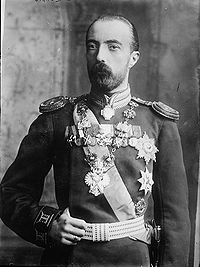 |
Michael Mikhailovich | Mikhail Nikolaievich | 16 October 1861 | 26 April 1929 | |
| Viatcheslav Konstantinovich | Konstantin Nikolaievich Grand Duke Konstantin Nikolayevich of Russia Grand Duke Konstantin Nikolayevich of Russia was the second son of Tsar Nicholas I of Russia.During the reign of his brother Alexander II, Konstantin was an admiral of the Russian fleet and reformed the Russian Navy. He was also an instrumental figure in the emancipation of the serfs... |
13 July 1862 | 27 February 1879 | ||
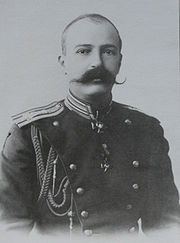 |
George Mikhailovich Grand Duke George Mikhailovich of Russia (1863-1919) Grand Duke George Mikhailovich of Russia was a son of Grand Duke Michael Nicolaievich of Russia and a first cousin of Emperor Alexander III. He was a General in the Russian army in World War I... |
Mikhail Nikolaievich | 23 August 1863 | 30 January 1919 | |
| Peter Nikolaievich Grand Duke Peter Nicolaievich of Russia Grand Duke Peter Nikolaevich of Russia was a member of the Russian Imperial Family.-Early life and marriage:... |
Nikolai Nikolaievich | 22 January 1864 | 17 June 1931 | ||
| Alexander Mikhailovich Grand Duke Alexander Mikhailovich of Russia Grand Duke Alexander Mihailovich of Russia, Александр Михайлович Aleksandr Mihailovits was a dynast of the Russian Empire, a naval officer, an author, explorer, the brother-in-law of Emperor Nicholas II, and an advisor of the said Emperor.-Biography: Alexander was born the son of Grand Duke... |
Mikhail Nikolaievich | 13 April 1866 | 26 February 1933 | ||
| Nikolai Alexandrovich Nicholas II of Russia Nicholas II was the last Emperor of Russia, Grand Prince of Finland, and titular King of Poland. His official short title was Nicholas II, Emperor and Autocrat of All the Russias and he is known as Saint Nicholas the Passion-Bearer by the Russian Orthodox Church.Nicholas II ruled from 1894 until... |
Alexander Alexandrovich Alexander III of Russia Alexander Alexandrovich Romanov , historically remembered as Alexander III or Alexander the Peacemaker reigned as Emperor of Russia from until his death on .-Disposition:... |
6 May 1868 | 17 July 1918 | succeeded as Emperor Nicholas II in 1894 | |
| Alexander Alexandrovich Grand Duke Alexander Alexandrovich of Russia Grand Duke Alexander Alexandrovich of Russia was the infant son of Alexander III and Empress Marie of Russia. At the time of his birth, his father, as the eldest son of Tsar Alexander II, was titled as the Tsarevich of Russia... |
Alexander Alexandrovich Alexander III of Russia Alexander Alexandrovich Romanov , historically remembered as Alexander III or Alexander the Peacemaker reigned as Emperor of Russia from until his death on .-Disposition:... |
7 June 1869 | 2 May 1870 | ||
| Sergei Mikhailovich Grand Duke Sergei Mikhailovich of Russia Grand Duke Sergei Mikhailovich of Russia was the fifth son of Grand Duke Michael Nikolaievich of Russia and a first cousin of Alexander III of Russia. He followed a military career and served as General Inspector of the Artillery with the rank of Adjutant General during World War I... |
Mikhail Nikolaievich | 7 October 1869 | 17/18 July 1918 | ||
| George Alexandrovich Grand Duke George Alexandrovich of Russia Grand Duke George Alexandrovich of Russia, , was the third son of Alexander III and Empress Marie of Russia. He was named George after his mother's younger brother, King George I of Greece... |
Alexander Alexandrovich Alexander III of Russia Alexander Alexandrovich Romanov , historically remembered as Alexander III or Alexander the Peacemaker reigned as Emperor of Russia from until his death on .-Disposition:... |
6 May 1871 | 9 August 1899 | ||
| Alexander Vladimirovich | Vladimir Alexandrovich Grand Duke Vladimir Alexandrovich of Russia Grand Duke Vladimir Alexandrovich of Russia ) was a son of Emperor Alexander II of Russia... |
31 August 1875 | 16 March 1877 | ||
| Alexei Mikhailovich | Mikhail Nikolaievich | 28 December 1875 | 1 March 1895 | ||
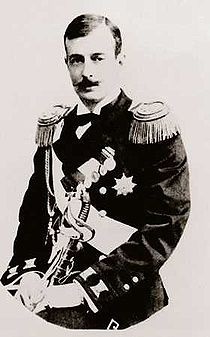 |
Kirill Vladimirovich Grand Duke Cyril Vladimirovich of Russia Grand Duke Cyril Vladimirovich of Russia was a member of the Russian Imperial Family. After the Russian Revolution of 1917 and the deaths of Tsar Nicholas II and his brother Michael, Cyril assumed the Headship of the Imperial Family of Russia and later the title Emperor and Autocrat of all the... |
Vladimir Alexandrovich Grand Duke Vladimir Alexandrovich of Russia Grand Duke Vladimir Alexandrovich of Russia ) was a son of Emperor Alexander II of Russia... |
30 September 1876 | 13 October 1938 | |
| Boris Vladimirovich Grand Duke Boris Vladimirovich of Russia Grand Duke Boris Vladimirovich of Russia was a son of Grand Duke Vladimir Alexandrovich of Russia, a grandson of Czar Alexander II of Russia and a first cousin of Czar Nicholas II. He followed a military career and was a Major General in the Russian Army. He took part in the Russo-Japanese War and... |
Vladimir Alexandrovich Grand Duke Vladimir Alexandrovich of Russia Grand Duke Vladimir Alexandrovich of Russia ) was a son of Emperor Alexander II of Russia... |
24 November 1877 | 9 November 1943 | ||
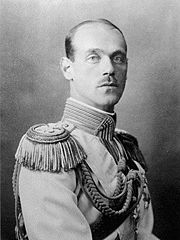 |
Mikhail Alexandrovich Grand Duke Michael Alexandrovich of Russia Grand Duke Michael Alexandrovich of Russia was the youngest son of Emperor Alexander III of Russia.At the time of his birth, his paternal grandfather was still the reigning Emperor of All the Russias. Michael was fourth-in-line to the throne following his father and elder brothers Nicholas and... |
Alexander Alexandrovich Alexander III of Russia Alexander Alexandrovich Romanov , historically remembered as Alexander III or Alexander the Peacemaker reigned as Emperor of Russia from until his death on .-Disposition:... |
22 November 1878 | 13 July 1918 | succeeded briefly and only titularly as Emperor Michael II in 1917 |
| Andrew Vladimirovich Grand Duke Andrei Vladimirovich of Russia Grand Duke Andrei Vladimirovich of Russia was a Russian grand duke, the youngest son of Grand Duke Vladimir Alexandrovich of Russia and Grand Duchess Maria Pavlovna.-Biography:... |
Vladimir Alexandrovich Grand Duke Vladimir Alexandrovich of Russia Grand Duke Vladimir Alexandrovich of Russia ) was a son of Emperor Alexander II of Russia... |
14 May 1879 | 30 October 1956 | ||
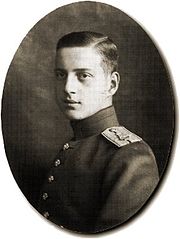 |
Dmitri Pavlovich | Pavel Alexandrovich Grand Duke Paul Alexandrovich of Russia Grand Duke Paul Alexandrovich of Russia was the eighth child of Tsar Alexander II of Russia by his first wife Empress Maria Alexandrovna. His birth was commemorated by the naming of the city of Pavlodar in Kazakhstan... |
18 September 1891 | 5 March 1941 | |
 |
Tsarevich Alexei Nikolaievich | Nicholai Alexandrovich Nicholas II of Russia Nicholas II was the last Emperor of Russia, Grand Prince of Finland, and titular King of Poland. His official short title was Nicholas II, Emperor and Autocrat of All the Russias and he is known as Saint Nicholas the Passion-Bearer by the Russian Orthodox Church.Nicholas II ruled from 1894 until... |
12 August 1904 | 17 July 1918 |
Amazingly enough, after 1918 no such boy was born into the deposed imperial house who would have been entitled to the title grand duke - i.e., had been a male-line grandson of a reigning emperor; although such would have been technically possible, as there lived sons of reigning emperors and their sons would have been so entitled.
Fictional Grand Dukes of Russia
- A Grand Duke Leonid of Russia appears in the Lucky LukeLucky LukeLucky Luke is a Belgian comics series created by Belgian cartoonist, Maurice De Bevere better known as Morris, the original artist, and was for one period written by René Goscinny...
comic book Le Grand DucLe Grand DucLe Grand Duc is a Lucky Luke adventure written by Goscinny and illustrated by Morris. It is the fortieth book in the series and It was originally published in French in the year 1973 .-Plot:...
(first published in 1973), by MorrisMorris (comics)Maurice De Bevere , better known as Morris, was a Belgian cartoonist and the creator of Lucky Luke. His pen name is an alternate spelling of his first name.-Biography:...
and René GoscinnyRené GoscinnyRené Goscinny was a French comics editor and writer, who is best known for the comic book Astérix, which he created with illustrator Albert Uderzo, and for his work on the comic series Lucky Luke with Morris and Iznogoud with Jean Tabary.-Early life:Goscinny was born in Paris in 1926, to a family...
. - A Grand Duke Alexei of Russia appears in the Sherlock HolmesSherlock HolmesSherlock Holmes is a fictional detective created by Scottish author and physician Sir Arthur Conan Doyle. The fantastic London-based "consulting detective", Holmes is famous for his astute logical reasoning, his ability to take almost any disguise, and his use of forensic science skills to solve...
short story The Adventure of the Seven ClocksThe Adventure of the Seven ClocksThe Adventure of the Seven Clocks is a Sherlock Holmes story by Adrian Conan Doyle and John Dickson Carr. The story was published in the 1954 collection, The Exploits of Sherlock Holmes....
, by Adrian Conan DoyleAdrian Conan DoyleAdrian Malcolm Conan Doyle was the youngest son of Sir Arthur Conan Doyle and his second wife Jean, Lady Conan Doyle. He had two siblings, a sister, Jean, and a brother, Denis....
and John Dickson CarrJohn Dickson CarrJohn Dickson Carr was an American author of detective stories, who also published under the pen names Carter Dickson, Carr Dickson and Roger Fairbairn....
.
About the Grand Duke of Russia in translated contexts
The title of sovereign Grand Duke and it as translation of Velikiy Knjaz have clearly different meanings. This occurs particularly in languages which do not have different words for princePrince
Prince is a general term for a ruler, monarch or member of a monarch's or former monarch's family, and is a hereditary title in the nobility of some European states. The feminine equivalent is a princess...
(1) signifying the non-ruling relatives of a monarch, i.e as a courtesy title
Courtesy title
A courtesy title is a form of address in systems of nobility used for children, former wives and other close relatives of a peer. These styles are used 'by courtesy' in the sense that the relatives do not themselves hold substantive titles...
, and (2) prince signifying a monarch
Monarch
A monarch is the person who heads a monarchy. This is a form of government in which a state or polity is ruled or controlled by an individual who typically inherits the throne by birth and occasionally rules for life or until abdication...
(sovereign or like), i.e as a substantive title
Substantive title
A substantive title is a title of nobility or royalty held by someone , which was acquired either by direct grant or inheritance...
, because there Grand Duke usually is (1) the established translation of the post-medieval courtesy title Velikiy Knjaz (literally: grand prince), and they are not sovereigns, but (2) several other post-medieval grand dukes are, being typically rulers of small states (such as Luxembourg
Luxembourg
Luxembourg , officially the Grand Duchy of Luxembourg , is a landlocked country in western Europe, bordered by Belgium, France, and Germany. It has two principal regions: the Oesling in the North as part of the Ardennes massif, and the Gutland in the south...
). English and French use the title Grand Duke for both these purposes. In translations and such texts, (2) Grand Duke of Russia may also refer to some or all of the medieval reigning grand princes of the Kievan Rus and its successor states.
Grand Duke is the usual and established translation in English and French of the Russian courtesy title Velikiy Knjaz (grand prince) of Russia, which from 17th century belonged to members of the family of the Russian tsar, although those Grand dukes were not sovereigns.
Note that a Grand Duke
Grand Duke
The title grand duke is used in Western Europe and particularly in Germanic countries for provincial sovereigns. Grand duke is of a protocolary rank below a king but higher than a sovereign duke. Grand duke is also the usual and established translation of grand prince in languages which do not...
or Grand Duchess as a translation is thus not necessarily associated with a Grand Duchy; see the relevant articles for more information. These post-medieval Russian grand dukes are not associated with a grand duchy.
Any other translation of Velikiy Knjaz of Russia than Grand Duke is neither standard nor widely used in English nor in French. In German, however, a Russian Grand Duke is known as a Großfürst, and in Latin
Latin
Latin is an Italic language originally spoken in Latium and Ancient Rome. It, along with most European languages, is a descendant of the ancient Proto-Indo-European language. Although it is considered a dead language, a number of scholars and members of the Christian clergy speak it fluently, and...
as Magnus Princeps.
A Russian Grand Duke or Grand Duchess was an Imperial Highness.
See also
- List of Grand Duchesses of Russia
- See Line of succession to the Russian throneLine of succession to the Russian ThroneThe Monarchy of Russia was abolished in 1917 following the February Revolution, which forced Emperor Nicholas II to abdicate. The issue of who is the current Pretender is open to debate.-Line of succession in March 1917:...
for post-revolutionary claimants to the title of Grand Duke

